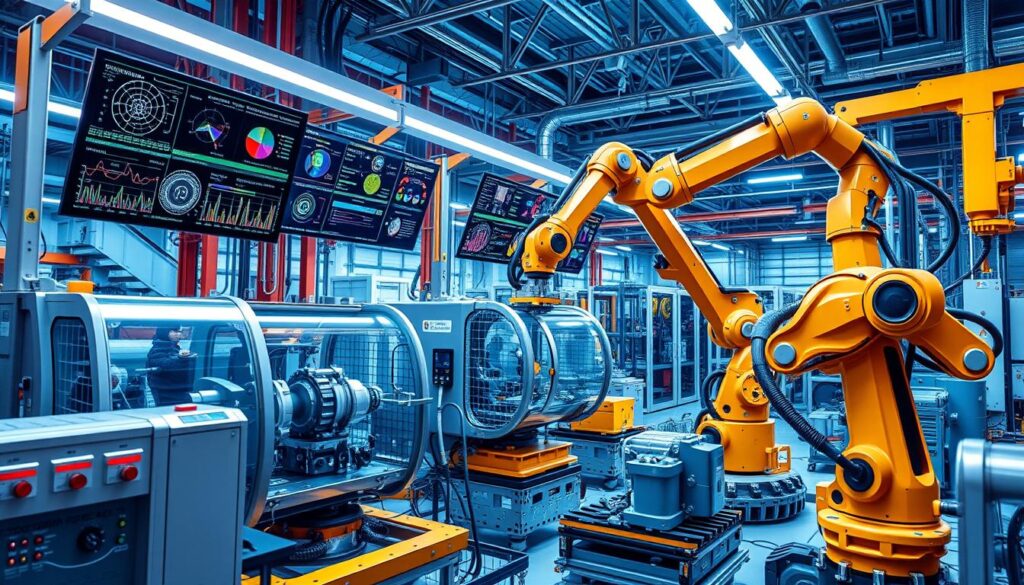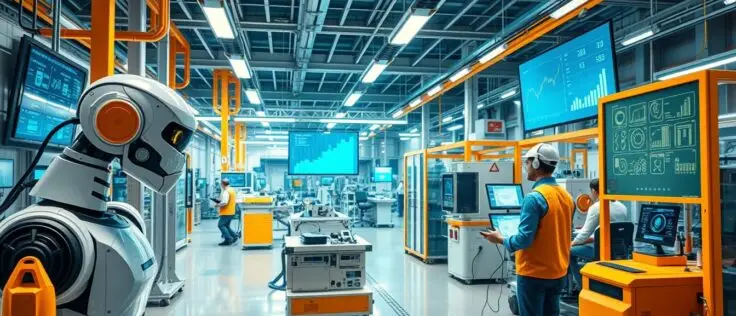Since 2011, Professor Wolfgang Wahlster introduced Industry 4.0, changing how we see AI in Manufacturing. This shift towards digital, with IoT and Industrial Automation at its heart, has not only made processes smoother but also changed manufacturing’s core values1.
AI and Machine Learning are at the forefront, making systems smarter and more self-sufficient. They’re pushing Smart Manufacturing to new heights of efficiency and foresight. The advancement in GenAI tools also highlights AI’s role in pushing industrial innovation to its limits2.
Yet, as AI grows in use for maintenance, quality, and stock control, a talent shortage remains a hurdle, noted by 57% of manufacturers2. Still, 76% are eager to use AI, and 91% see it as critical for the future. With the UK leading in AI startups in Europe and AI helping tackle big challenges like energy costs, Industry 4.0 is remaking Smart Manufacturing globally1.
As we face a future demanding fast adaptation, AI becomes crucial. It’s key for meeting supply and demand, moving towards greener methods. AI’s power lies from enhancing day-to-day operations to improving the entire supply chain and customer happiness. This marks a turning point in commerce worldwide3.
The Evolution of Artificial Intelligence in Smart Manufacturing
Artificial Intelligence (AI) and Machine Learning (ML) are changing manufacturing. They lead us to smarter, quicker production. As the heart of Industry 4.0, these technologies enhance manufacturing systems worldwide.
The Foundation of Industry 4.0: AI and ML
AI and ML are key in smart manufacturing, boosting Machine Learning. They help in making better decisions. From predictive maintenance to managing energy, their roles are crucial in improving operations. By late 2023, AI reduced downtime and raised product quality with quality control4. These AI systems spot defects early and manage maintenance, ensuring top-notch products and smooth production5.
Smart Machines and IoT Integration
Smart devices and IoT integration are important in advanced industries. IoT lets smart machines share data and self-adjust. Deloitte notes many executives see AI as key for competitive manufacturing6. IoT and AI help machines work precisely, adjust swiftly, and keep learning. This sets new excellence levels in manufacturing.
The Continuous Improvement Cycle in AI-Driven Manufacturing
AI is reshaping smart manufacturing, pushing new limits in production efficiency and quality. It’s becoming essential for businesses aiming for excellence.
Revolutionising Production Efficiency with AI
Using AI in factories is changing how we think about making things better and faster. Companies like Siemens and General Electric are seeing big improvements. They have fewer unexpected problems and spend less on repairs7. AI helps make manufacturing smoother, increasing how much and how fast we produce7.
AI is changing more than just maintenance and operations. It lets factories quickly change what they make to meet unique customer needs. For example, Nike uses AI to create custom shoes, making customers really happy8. Being able to match what consumers want quickly is a big change towards more flexible manufacturing.
AI also makes factories safer and more productive. Robots that can do precise jobs like assembly and painting work with humans. They do risky jobs, keeping people safe7. This team-up of humans and robots shows how AI can make places safer and work better.
Getting on board with AI is crucial for factories wanting to stay ahead. Adding AI to the process makes work smoother, cuts costs, and increases what can be made. The ones using these new tools are paving the way, showing that smart manufacturing is here to stay and will shape the future.
AI in Manufacturing: Transforming Industrial Automation
The use of Artificial Intelligence (AI) in the manufacturing world is changing how factories work. This transformation leads to smarter factory operations. It makes them more effective and adjustable to changes. AI and robotics together are key to boosting productivity and smooth operations.
Factory Automation's Leap Forward
AI has brought big changes in how factories operate. It cuts down on time and material costs, which makes things run smoother. Intelligent software also improves how things are designed and made, showing big gains in efficiency9.
AI systems that check products are now better than humans. They can look over thousands of items every minute much more precisely9.
Incorporation of Robotics and AI
Using AI in business clearly points towards a future where factory automation and robotics work together in smarter ways.
Advancing Predictive Maintenance through Machine Learning
Using Machine Learning for predictive maintenance in manufacturing improves equipment care and efficiency. It’s not just about spotting issues early. It also predicts them to cut downtime and save on costs. Machine Learning boosts machine function by 10 to 20%. It also reduces maintenance costs by up to 10%11.
Machine Learning algorithms look at past and present data to predict machine health. This planning means maintenance happens only when needed. It makes equipment last longer and cuts scheduling time by half, boosting manufacturing efficiency11.
In industries like pharmaceuticals, where automation is key, machine failures can cause a quarter of all stoppages11. Machine Learning uses continuous data to anticipate breakdowns. This stops unplanned stops, important in critical sectors.

Research shows that mixing preventive with predictive maintenance betters asset reliability and prevents breakdowns. Supervised learning predicts failure chances, improving the maintenance model12. Reinforcement learning also helps by making the best maintenance plans, using resources wisely to stabilize operations12.
In conclusion, Machine Learning changes predictive maintenance from a basic task to a key strategy for better manufacturing. Adopting these smart technologies helps industries cut unexpected stops and maintenance costs. It leads to a smooth, dependable production line ready for challenges.
Enhancing Quality Control with AI Algorithms
AI algorithms have greatly improved quality control in manufacturing. They make sure products always meet strict quality standards. Now, with real-time defect detection and automated inspection, industries can keep up high-quality work more precisely.
Using AI changes how we monitor and spot problems on production lines. These technologies learn and get better at finding defects, stopping quality issues before they happen. In fields like electronics and pharmaceuticals, AI systems cut down defects. This makes products safer and more reliable13.
Real-Time Defect Detection
AI and machine vision find issues right as they happen. This saves time and materials by cutting down on rework and waste. For example, machine learning lets engineers step in quickly, reducing hidden defects14.
AI-Powered Quality Assurance Systems
AI quality systems use deep learning to give deep insights into production quality. They take data from many places, like production stats and feedback, to improve quality. Predictive maintenance, predicted by these systems, saves resources and reduces surprise downtime13.
AI also helps identify safety risks, making workplaces safer and following rules. Plus, it can understand customer feedback better, improving relationships and responding well to their needs13.
Audi saved 30-50% on quality control costs with AI machine vision. These changes not only save money but also give a competitive edge through better quality management.
Streamlining Supply Chain Optimization with AI Insights
Artificial Intelligence (AI) is changing how supply chains are managed. It’s making Supply Chain Optimization, Predictive Analytics, and Intelligent Inventory Management much better. Thanks to AI, businesses can now adapt quicker and more effectively to changes in the market and customer demands.
For example, supply chain organizations expect to see a big jump in how much they use machines. They think machine use will double in the next five years15. Also, money spent on Industrial Internet of Things (IIoT) Platforms will likely go from $1.67B in 2018 to $12.44B in 2024. That’s a yearly growth rate of 40%16. This spike in spending is because AI-driven supply chains are really good at planning capacity, forecasting demand, and being overall more efficient15.
Also, using AI for inventory management fixes the problems of having too much or not enough stock. It makes predicting supply and demand much better15. This smarter way of managing inventory cuts down waste and increases profits. It ensures the right products are there when customers want them16. Plus, AI makes managing warehouses better by making complex tasks simpler and safer. It does this by reducing the need for human labour15.
Putting AI into supply chain processes does have its challenges, like the high cost of AI hardware and the need for regular maintenance15. Yet, the benefits in the long run, including up to 15% cost reductions and the chance to create $2 trillion in value by 2025, are strong reasons for companies to start using intelligent automation17.
In summary, using AI for Supply Chain Optimization isn’t just about new tech. It’s about completely changing how inventory and operations are managed. AI’s help with Predictive Analytics and Intelligent Inventory Management means supply chains can respond better. They become smarter at dealing with the ups and downs of today’s unpredictable market.
Data Analytics for Smarter Manufacturing Processes
Data Analytics is changing manufacturing into smarter ways of working. It’s crucial for making lots of data useful. This makes operations work better.
Turning Data into Actionable Knowledge
With Industry 4.0, using Big Data is all about finding meaning and insights for smart decisions. Data Analytics lets manufacturers find areas to get better, predict when machines might fail, and understand people’s needs more clearly. This turns Big Data into smart plans, making everything run smoother and reducing times when production stops. It leads to a more flexible manufacturing world18.
Leveraging Big Data for Process Optimisation
Data Analytics is key to smarter manufacturing. It gives better control of how we make things. Predictive maintenance means expecting machine problems before they happen. This saves money and makes machines last longer18. Big Data also means using resources better, cutting costs, and making things more efficiently18. With smart algorithms and learning models, manufacturers can now meet market needs faster and even predict future trends.
In conclusion, as technology advances, Data Analytics plays a bigger role in making manufacturing smarter and sustainable. The insights from Big Data not only give companies an advantage but also help them adjust quickly to new market trends.
AI's Role in Shaping Future Manufacturing Strategies
Looking ahead, artificial intelligence (AI) is becoming key in shaping the future of manufacturing. It’s expected to grow to about $68.36 billion by 203219. This huge impact means integrating AI into strategies is essential for businesses to stay competitive. AI has already improved how we make electrical devices, adjusting machines for better use of resources and fewer mistakes20.
AI also makes supply chains more efficient. For instance, it has cut forecasting errors in half and helped companies like BMW manage inventory better20. These advancements lead to more precise production processes.
Two-thirds of industry leaders believe AI is crucial for advancement in the coming years21. It’s changing the game with maintenance strategies that nearly eliminate errors. Plus, AI’s role in creating unique designs helps companies stand out in a changing market. Cloud-based AI is also making product development phases smoother and more consistent21.
Today, manufacturers see AI as a creative partner, not just a tool that makes decisions. Firms like McKinsey highlight manufacturing as a leading sector in AI use19. This partnership between human creativity and machine intelligence keeps businesses leading in the Industry 4.0 era. It helps them meet market challenges with AI guiding the way.
FAQ
How is AI revolutionising Industry 4.0 and smart manufacturing?
AI is changing Industry 4.0 and smart manufacturing by bringing in smart systems that learn and improve on their own. These systems increase how well factories work, make maintenance better, and improve quality control. They help in making smart decisions, work well with IoT, and push industrial automation to new levels.
What role do Machine Learning and AI play in the foundational development of Industry 4.0?
Machine Learning and AI are the backbone of Industry 4.0. They make machines more intelligent, help analyze data in real-time, and allow machines to learn and get better on their own. This leads to more efficient and flexible manufacturing processes.
In what ways are smart machines and IoT integration enhancing manufacturing?
Smart machines and IoT make manufacturing better by improving how devices talk and share data. This leads to better teamwork, more efficiency in production, and quick changes to meet new market needs or operational situations.
What is the continuous improvement cycle in AI-driven manufacturing?
In AI-driven manufacturing, the continuous improvement cycle involves always collecting and studying data to make things better. This means making work processes better, less waste, and machines work better without needing people.
What advancements in production efficiency has AI introduced to smart manufacturing?
AI has brought major improvements in how efficiently things are made. It can quickly adjust to changes in what people want, cut down the time needed to make things, get rid of waste, and make manufacturing smoother for products that are customized and green.
How has industrial automation been transformed with the incorporation of AI?
By adding AI, industrial automation has gotten much better. Factories are more automatic, robots are smarter, and systems can do complex tasks more accurately. This all leads to production lines that are more efficient and can be tailored to specific needs.
What are the benefits of integrating robotics and AI in manufacturing?
Mixing robotics and AI in manufacturing brings many good things like better accuracy, more personalization, safer work environments, and better teamwork between people and robots. This all leads to higher productivity and more innovation.
How does Machine Learning advance predictive maintenance in manufacturing?
Machine Learning moves predictive maintenance forward by looking at data from machines to guess failures before they happen. This means maintenance can be done just at the right time, reducing sudden stops and making machines last longer.
In what capacity is AI enhancing quality control within the manufacturing industry?
AI is making quality control better by checking things automatically, spotting defects as they happen, and learning from these defects to make sure products are always of high quality and waste is less.
What improvements has AI-powered real-time defect detection made to manufacturing processes?
AI-powered detection helps find and fix problems right away in manufacturing. This cuts down the time and effort spent on checking quality and reduces the chance of bad products getting to customers.
How does AI contribute to supply chain optimisation?
AI helps make the supply chain better by foreseeing demand and managing stock more effectively, reducing the risk of disruption, and using smart insights to improve how logistics and distribution are done.
How do data analytics and AI work together to create smarter manufacturing processes?
Data analytics and AI work together by looking at lots of data from operations to find useful information. This information helps make manufacturing better, keep systems working well, and makes decisions that lead to smarter, more efficient production.
What role does leveraging big data play in process optimisation for manufacturing?
Using big data is key in making manufacturing processes better by giving AI the data it needs to find problems, predict trends, and suggest changes. This makes operations smoother, cuts down on waste, and increases productivity.
How will AI influence future manufacturing strategies?
AI will shape future manufacturing by helping with digital change. It will make advanced predictive models, drive innovation with new designs, and better decision-making. This will keep manufacturers competitive and ready for future industry changes and market needs.
Source Links
- Exploring the trends, challenges and opportunities of Smart Manufacturing – https://www.themanufacturer.com/articles/exploring-the-trends-challenges-and-opportunities-of-smart-manufacturing/
- The Future of AI in Manufacturing – https://www.azumuta.com/blog/future-of-ai-in-manufacturing/
- How AI is Speeding the Rise of “Industry 4.0” – https://social-innovation.hitachi/en-us/think-ahead/manufacturing/ai-for-smart-manufacturing-industry-4-0/
- The Evolution of Manufacturing: How AI is revolutionizing the industry in late 2023 – https://www.linkedin.com/pulse/evolution-manufacturing-how-ai-revolutionizing-late-2023-kulshrestha
- Embracing the Power of AI and Machine Learning in Smart Manufacturing – https://www.smartfactorymom.com/blog/embracing-the-power-of-ai-and-machine-learning-in-smart-manufacturing/
- The Evolution of AI in Manufacturing – Augmentir – https://www.augmentir.com/blog/the-evolution-of-ai-in-manufacturing
- How AI is Revolutionizing Production Efficiency in Manufacturing – https://www.linkedin.com/pulse/how-ai-revolutionizing-production-efficiency-dianah-nyamweya-acplf
- Revolutionizing Manufacturing: The AI Impact – insideAI News – https://insideainews.com/2024/07/31/revolutionizing-manufacturing-the-ai-impact/
- How Artificial Intelligence (AI) is Revolutionising the Manufacturing of Automated Machinery – SP Automation & Robotics – https://sp-automation.co.uk/how-artificial-intelligence-ai-is-revolutionising-the-manufacturing-of-automated-machinery/
- AI in manufacturing | KAIZEN™ Article – https://kaizen.com/insights/ai-discrete-manufacturing-industry/
- Predictive Maintenance with Machine Learning in 2024 – https://scw.ai/blog/predictive-maintenance-with-machine-learning/
- How AI Is Used in Predictive Maintenance | Neural Concept – https://www.neuralconcept.com/post/how-ai-is-used-in-predictive-maintenance
- AI in Quality Assurance: The Next Big Thing in Quality Management – https://www.effivity.com/blog/ai-in-quality-assurance-the-next-big-thing-in-quality-management
- How to Use AI for Quality Control in Manufacturing – Engineering.com – https://www.engineering.com/how-to-use-ai-for-quality-control-in-manufacturing/
- Artificial Intelligence (AI) in Supply Chain and Logistics – https://throughput.world/blog/ai-in-supply-chain-and-logistics/
- Reap the Benefits of AI in Supply Chain – https://www.oracle.com/uk/scm/ai-supply-chain/
- Streamlining Supply Chains: The AI Revolution in Logistics – https://www.linkedin.com/pulse/streamlining-supply-chains-ai-revolution-logistics-zeusglobal-z7rve
- Revolutionizing Manufacturing: Harnessing the Power of Data Analytics – https://www.linkedin.com/pulse/revolutionizing-manufacturing-harnessing-power-data-analytics-o88bc
- The Future Of Factories: How AI Is Shaping Manufacturing – https://medium.com/@kanerika/the-future-of-factories-how-ai-is-shaping-manufacturing-b29a879e7a3f
- AI in Manufacturing: Use Cases & Future Trends – https://www.solulab.com/role-of-ai-in-the-manufacturing-industry/
- The role of AI in shaping tomorrow’s industry. – https://manufacturing-today.com/news/the-role-of-ai-in-shaping-tomorrows-industry/






